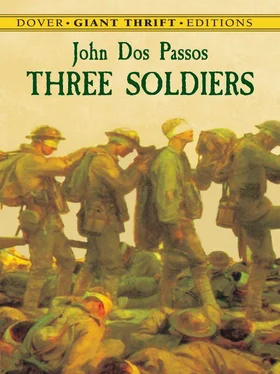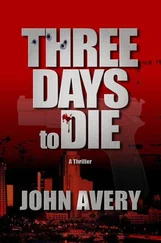The girl came out of the inner room. She gave him her hand indifferently.
“Comment ça va! Yvonne? Bon?”
His pidgin-French made her show her little pearly teeth in a smile.
“Good,” she said in English.
They laughed childishly.
“Say, will you be my girl, Yvonne?”
She looked in his eyes and laughed.
“Non compris,” she said.
“We, we; voulez vous et’ ma fille?”
She shrieked with laughter and slapped him hard on the cheek.
“Venez,” she said, still laughing. He followed her. In the inner room was a large oak table with chairs round it. At the end Eisenstein and a French soldier were talking excitedly, so absorbed in what they were saying that they did not notice the other two. Yvonne took the Frenchman by the hair and pulled his head back and told him, still laughing, what Fuselli had said. He laughed.
“No, you must not say that,” he said in English, turning to Fuselli.
Fuselli was angry and sat down sullenly at the end of the table, keeping his eyes on Yvonne. She drew the knitting out of the pocket of her apron and holding it up comically between two fingers, glanced towards the dark corner of the room where an old woman with a lace cap on her head sat asleep, and then let herself fall into a chair.
“Boom!” she said.
Fuselli laughed until the tears filled his eyes. She laughed too. They sat a long while looking at each other and giggling, while Eisenstein and the Frenchman talked. Suddenly Fuselli caught a phrase that startled him.
“What would you Americans do if revolution broke out in France?”
“We’d do what we were ordered to,” said Eisenstein bitterly. “We’re a bunch of slaves.” Fuselli noticed that Eisenstein’s puffy sallow face was flushed and that there was a flash in his eyes he had never seen before.
“How do you mean, revolution?” asked Fuselli in a puzzled voice.
The Frenchman turned black eyes searchingly upon him.
“I mean, stop the butchery, — overthrow the capitalist government.-The social revolution.”
“But you’re a republic already, ain’t yer?”
“As much as you are.”
“You talk like a socialist,” said Fuselli. “They tell me they shoot guys in America for talkin’ like that.”
“You see!” said Eisenstein to the Frenchman.
“Are they all like that?”
“Except a very few. It’s hopeless,” said Eistenstein, burying his face in his hands. “I often think of shooting myself.”
“Better shoot someone else,” said the Frenchman. “It will be more useful.”
Fuselli stirred uneasily in his chair.
“Where’d you fellers get that stuff anyway?” he asked. In his mind he was saying: “A kike and a frog, that’s a good combination.”
His eye caught Yvonne’s and they both laughed. Yvonne threw her knitting ball at him. It rolled down under the table and they both scrambled about under the chairs looking for it.
“Twice I have thought it was going to happen,” said the Frenchman.
“When was that?”
“A little while ago a division started marching on Paris… And when I was in Verdun… O there will be a revolution… France is the country of revolutions.”
“We’ll always be here to shoot you down.” said Eisenstein.
“Wait till you’ve been in the war a little while. A winter in the trenches will make any army ready for revolution.”
“But we have no way of learning the truth. And in the tyranny of the army a man becomes a brute, a piece of machinery. Remember you are freer than we are. We are worse than the Russians!”
“It is curious!… O but you must have some feeling of civilization. I have always heard that Americans were free and independent. Will they let themselves be driven to the slaughter always?”
“O I don’t know.” Eisenstein got to his feet. “We’d better be getting to barracks. Coming, Fuselli?” he said.
“Guess so,” said Fuselli indifferently, without getting up.
Eisenstein and the Frenchman went out into the shop.
“Bon swar,” said Fuselli, softly, leaning across the table. “Hey, girlie?”
He threw himself on his belly on the wide table and put his arms round her neck and kissed her, feeling everything go blank in a flame of desire.
She pushed him away calmly with strong little arms.
“Stop!” she said, and jerked her head in the direction of the old woman in the chair in the dark corner of the room. They stood side by side listening to her faint wheezy snoring.
He put his arms round her and kissed her long on the mouth.
“Demain,” he said.
She nodded her head.
Fuselli walked fast up the dark street towards the camp. The blood pounded happily through his veins. He caught up with Eisenstein.
“Say, Eisenstein,” he said in a comradely voice, “I don’t think you ought to go talking round like that. You’ll get yourself in too deep one of these days.”
“I don’t care!”
“But, hell, man, you don’t want to get in the wrong that bad. They shoot fellers for less than you said.”
“Let them.”
“Christ, man, you don’t want to be a damn fool,” expostulated Fuselli.
“How old are you, Fuselli?”
“I’m twenty now.”
“I’m thirty. I’ve lived more, kid. I know what’s good and what’s bad. This butchery makes me unhappy.”
“God, I know. It’s a hell of a note. But who brought it on? If somebody had shot that Kaiser.”
Eisenstein laughed bitterly. At the entrance of camp Fuselli lingered a moment watching the small form of Eisenstein disappear with its curious waddly walk into the darkness.
“I’m going to be damn careful who I’m seen goin’ into barracks with,” he said to himself. “That damn kike may be a German spy or a secret-service officer.” A cold chill of terror went over him, shattering his mood of joyous self-satisfaction. His feet slopped in the puddles, breaking through the thin ice, as he walked up the road towards the barracks. He felt as if people were watching him from everywhere out of the darkness, as if some gigantic figure were driving him forward through the darkness, holding a fist over his head, ready to crush him.
When he was rolled up in his blankets in the bunk next to Bill Grey, he whispered to his friend:
“Say, Bill, I think I’ve got a skirt all fixed up in town.”
“Who?”
“Yvonne-don’t tell anybody.”
Bill Grey whistled softly.
“You’re some highflyer, Dan.”
Fuselli chuckled.
“Hell, man, the best ain’t good enough for me.”
“Well, I’m going to leave you,” said Bill Grey.
“When?”
“Damn soon. I can’t go this life. I don’t see how you can.”
Fuselli did not answer. He snuggled warmly into his blankets, thinking of Yvonne and the corporalship.
In the light of the one flickering lamp that made an unsteady circle of reddish glow on the station platform Fuselli looked at his pass. From Reveille on February fourth to Reveille on February fifth he was a free man. His eyes smarted with sleep as he walked up and down the cold station platform. For twenty-four hours he wouldn’t have to obey anybody’s orders. Despite the loneliness of going away on a train in a night like this in a strange country Fuselli was happy. He clinked the money in his pocket.
Down the track a red eye appeared and grew nearer. He could hear the hard puffing of the engine up the grade. Huge curves gleamed as the engine roared slowly past him. A man with bare arms black with coal dust was leaning out of the cab, lit up from behind by a yellowish red glare. Now the cars were going by, flat cars with guns, tilted up like the muzzles of hunting dogs, freight cars out of which here and there peered a man’s head. The train almost came to a stop. The cars clanged one against the other all down the train. Fuselli was looking into a pair of eyes that shone in the lamplight; a hand was held out to him.
Читать дальше












